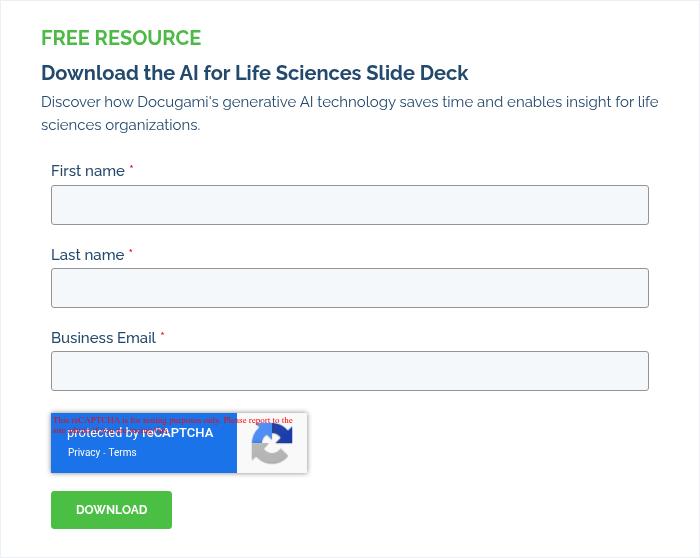It’s a fact of life for any life sciences company: your documents hold a wide variety of essential data, from regulatory filings and clinical trial protocols to supply chain agreements and patient consent forms. Extracting the essential data from these complex, unstructured or semi-structured documents has always been a time-consuming, manual process. But with Docugami, that’s changing.
Turning Life Sciences Documents into Actionable Data
Traditional document management solutions often fall short when handling highly variable, complex documents. Manual review processes are often needed for people to utilize the data, and they are expensive, time-consuming, and notoriously error-prone. Docugami’s AI-driven platform reduces the time needed for data extraction by automatically transforming unstructured text and tabular information into structured, actionable insights.
By leveraging Docugami’s Business Documents Foundation Model, trained on millions of business documents but customized for each client’s unique data sets, Docugami enables organizations to:
- Extract and analyze key patient data and research findings with minimal manual effort
- Generate automated reports with critical insights for drug development and medical devices
- Enhance compliance and risk management through AI-driven document review
- Streamline and accelerate workflows by integrating AI document processing into enterprise systems
Example Uses for AI in Life Sciences
The Life Sciences sector, across pharmaceutical, biotech, and many specialized services organizations, rely on countless documents that contain essential operational data. Docugami makes it easy to identify, extract, and leverage information across a wide range of use cases, including:
- Clinical Trial Protocols – Extract key regulatory and procedural details effortlessly to support personalized treatments
- Lab Reports & Diagnostic Documents – Generate structured summaries for faster decision-making in patient care
- Regulatory & Compliance Reports – Automate audit preparation and reduce compliance risks
- Contracts & Agreements – Quickly compare and analyze supplier terms, service agreements, and procurement documents to optimize the supply chain
Beyond Data Extraction: AI as a Digital Transformation Catalyst in Life Sciences
Unlike traditional AI models that require extensive training and predefined data fields, Docugami’s approach is flexible, scalable, secure, and user-friendly. Life sciences organizations need more than ad hoc query tools or ChatGPT trained on the internet with all its random information and hallucinations.
Serious business users need serious AI tools that are specifically designed for business use cases where accuracy, precision, and security are non-negotiable. With Docugami, business users and clinical professionals can:
- Generate structured data exports in Excel, XML, or API-ready formats for seamless integration into existing workflows
- Create automated abstracts of critical information to support predictive analytics for drug discovery
- “Chat” with all their documents to surface key insights and better understand the impact of AI on decision-making
Immediate ROI for Life Sciences with Minimal Setup
Docugami offers a no-code, user-friendly solution that doesn’t require extensive developer setup.
All that is required is to guide Docugami to the nuances of your terminology, to fine-tune the AI in life sciences modeling to deliver the accurate results you need. Organizations can instantly unlock valuable insights from their documents, leading to increased efficiency, reduced costs, and a competitive edge in an increasingly data-driven world.
Applying artificial intelligence capabilities to your business processes is no longer optional. The potential of AI to improve workflows and decision-making in the real world of life sciences companies is clear. But ‘why’ and ‘how’ you do it means a great deal to your bottom line, and to your mission. You need a system you can trust to not just experiment with, but to elevate your operations.
Put Docugami to Work Today and transform your organization from ‘document management’ to ‘knowledge management’.


